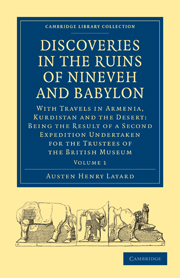 Discoveries in the Ruins of Nineveh and Babylon
Discoveries in the Ruins of Nineveh and Babylon Summary
In the preceding chapter I have given an account of the discoveries made in the ruins of Arban, I will now add a few notes of our residence on the Khabour. A sketch of Arab life, and a description of a country not previously visited by European travellers, may be new and not uninteresting to my readers.
During the time we dwelt at Arban, we were the guests and under the protection of Mohammed Emin, the Sheikh of the Jebours. On the day we crossed the river, he celebrated our arrival by a feast after the Arab fashion, to which the notables of the tribe were invited. Sheep, as usual, were boiled and served up piecemeal in large wooden bowls, with a mass of butter and bread soaked in the gravy. The chief's tent was spacious, though poorly furnished. It was the general resort of those who chanced to wander, either on business or for pleasure, to the Khabour, and was, consequently, never without a goodly array of guests; from a company of Shammar horsemen out on a foray to the solitary Bedouin who was seeking to become a warrior in his tribe, by first stealing a mare from some hostile encampment.
Amongst the strangers partaking, at the time of our visit, of the Sheikh's hospitality, were Serhan, a chief of the Agaydat, and Dervish Agha, the hereditary Lord of Nisibin, the ancient Nisibis.
- Type
- Chapter
- Information
- Discoveries in the Ruins of Nineveh and BabylonWith Travels in Armenia, Kurdistan and the Desert: Being the Result of a Second Expedition Undertaken for the Trustees of the British Museum, pp. 285 - 302Publisher: Cambridge University PressPrint publication year: 2010
